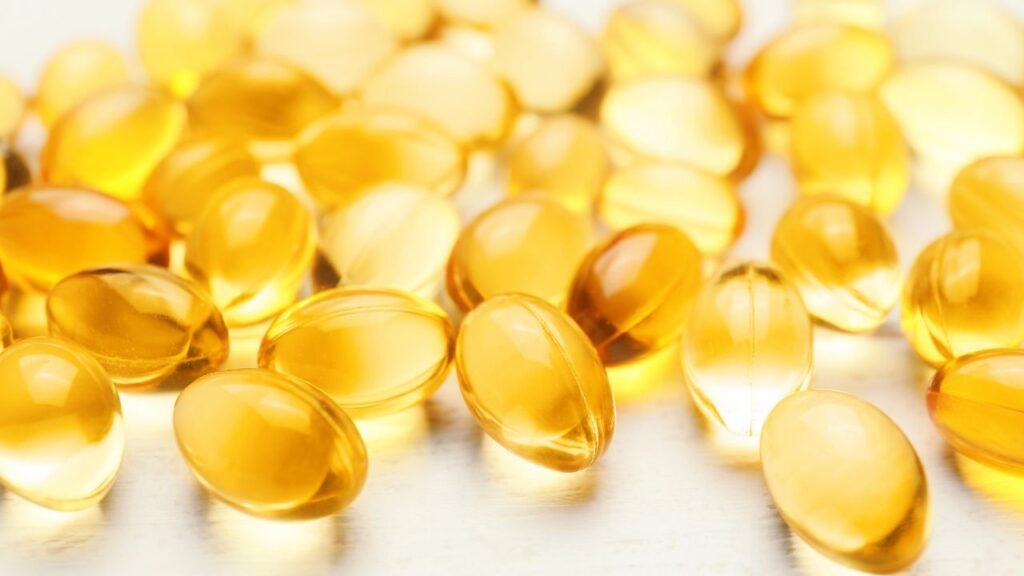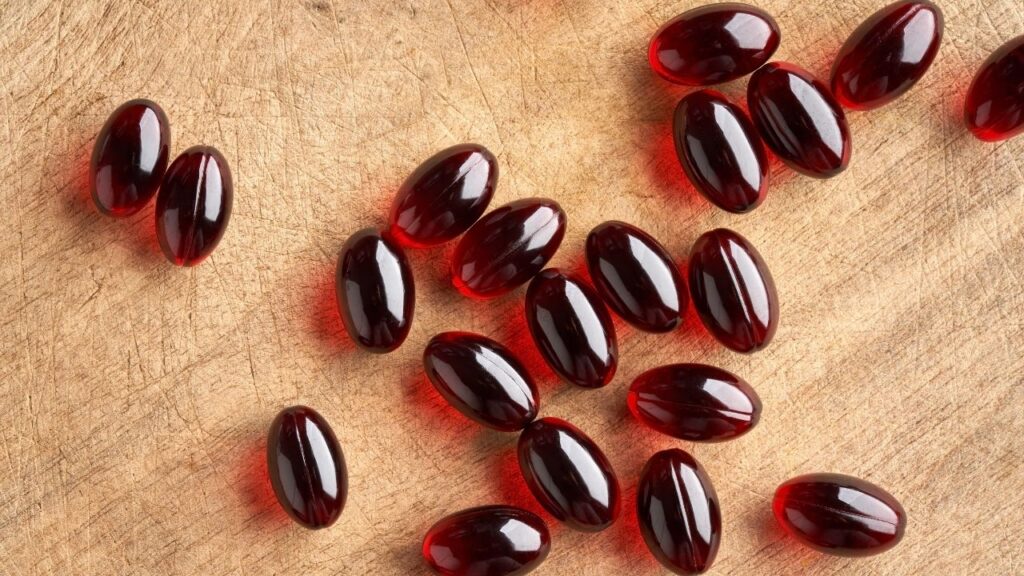While cod liver oil contains beneficial ingredients such as omega-3 fatty acids and vitamins A and D, the inconclusive scientific evidence, risk of toxicity, and potential associated bleeding issues make it a poor choice as a nutritional supplement in dogs.
Key Takeaways
- Dogs can benefit from cod liver oil, but currently other supplements have more proof of efficacy.
- You can give your dog human cod liver oil supplements, but consult with a veterinarian to determine a safe dose.
- In many cases fish oil is better for dogs than cod liver oil.
- Side effects of cod liver oil for dogs include vomiting, burping, poor appetite, vitamin D toxicity, and vitamin A toxicity.
What Is Cod Liver Oil?
As the name suggests, cod liver oil is a dietary supplement derived from the livers of cod fish. Commercial preparations are available in both liquid and capsule form or it can be obtained by directly consuming fresh cod liver.1
Cod liver oil is a rich source of omega-3 fatty acids as well as vitamins A and D.1
Cod Liver Oil Benefits for Dogs
Cod liver oil is a rich source of essential polyunsaturated omega 3 fatty acids2, particularly eicosapentaenoic acid (EPA) and docosahexaenoic acid (DHA).3 These compounds are used by the body to produce various cytokines and are also worked into cell membranes.
In particular, omega-3 fatty acids are very effective at reducing the expression of a compound called COX-2 which is involved in inflammation and is also elevated in some types of cancer.4 Omega-3 fatty acids have already shown benefit in the treatment and prevention of heart disease and arthritis.6 Recently, researchers have become interested in these fatty acids as part of cancer treatment as diets high in fish have been linked with lower incidences of cancer.4,5
Omega-3 fatty acids have many potential targets for helping with the prevention and treatment of cancer including:3,4
- slowing the proliferation (growth) of cancer cells
- encouraging apoptosis (death) of cancer cells
- limiting a tumor’s blood supply
- decreasing secondary inflammation
- decreasing metastasis (spread) of the tumor
- altering estrogen metabolism (which could impact estrogen-responsive tumors such as breast, prostate, and colon cancer)
- helping prevent weight loss and muscle wasting
Cod liver oil is also a source of vitamins A and D. Of these, vitamin D is the most likely to have a potential role to play in the treatment of cancer. Vitamin D is typically obtained through the diet in dogs and plays an important role in many different processes in the body including the maintenance of healthy bones.7
Diets high in fish have been linked with lower incidences of cancer.
Some types of cancer decrease the effectiveness of vitamin D in the body and supplementation may be necessary to keep the body functioning normally. Vitamin D may also have a direct effect on some cancer types by potentially decreasing the proliferation of the tumor and encouraging apoptosis of cancer cells.7
Research is ongoing into the roles that omega-3 fatty acids and vitamin D may have to play in the prevention and treatment of cancer. Unfortunately, so far, we don’t know the most effective use of these compounds. Cod liver oil itself has been studied very little as a cancer treatment.8
A few studies have shown some promise of:
- increased survival time for individuals with solid tumors or lung cancer9
- decreased risk of lung cancer10
- decreased weight loss and inflammation of the mouth of individuals with head and neck cancer11
However, other studies have shown opposite effects, even linking cod liver oil and omega-3 fatty acids with increased risk of melanoma12 and prostate cancer.13 At this time, the data is inconclusive as to whether cod liver oil may be beneficial in the prevention or treatment of cancer.
Food is medicine! Veterinarian Susan Recker recommends the best foods for dogs with cancer and food types to avoid for these pups in this episode of Dog Cancer Answers.
Common Uses for Cod Liver Oil for Dogs
Traditionally, cod liver oil is used as a vitamin D supplementation in areas that experience long, dark winters. Vitamin D supplementation is commonly used to help support good bone health.
One of the components of cod liver oil, omega-3 fatty acids, has shown benefit in helping prevent and treat heart disease and arthritis.
Current cancer research involving cod liver oil, omega-3 fatty acids, and vitamin D is mostly focused on these compounds’ use in the treatment of breast, colon, prostate, lung, and esophageal (throat) cancers in humans.
Safety and Side Effects of Cod Liver Oil
Omega-3 fatty acids are generally regarded as safe14 with mild side effects including:15
- Upset stomach
- Burping
- Heartburn
- A fishy taste in the mouth
Supplementing with high levels of omega-3 fatty acids may inhibit clotting and increase bleeding tendencies.15
Both vitamins A and D are fat soluble and can easily build up to toxic levels when supplemented. High vitamin D levels can cause:16
- Vomiting
- Diarrhea
- Decreased appetite
- Increased thirst
- Hypercalcemia—an increase in the amount of calcium in the body that can lead to mineralization of the organs and soft tissue
Excess vitamin A levels can cause:17
- Vomiting
- Lethargy
- Peeling of the skin
- Weight loss
- Birth defects when given to pregnant dogs
Cod liver oil contains excessively high levels of both vitamin A and D. A tablespoon of cod liver oil contains on average 13,600 IU of vitamin A and 1,360 IU of vitamin D.18 The maximum daily dose for dogs is 250,000 IU/kilogram of food (or 75mg/kg of food) of vitamin A and 5,000 IU/kilogram of food (or 0.125mg/kg) of vitamin D.22
The high levels of vitamins A and D in cod liver oil may increase the risk of toxicity in dogs receiving this supplement.17
High fat content in the diet or from lots of fatty acid supplements can exacerbate pancreatitis. Dr. Nancy Reese advises caller Susan on how to safely feed a dog with both cancer and pancreatitis in this episode of Dog Cancer Answers.
What Can Cod Liver Oil Be Given With?
Information on the use of cod liver oil alongside other treatment modalities is limited and further research is necessary to understand how cod liver oil may fit into a cancer treatment plan. One recent study showed no significant issues with the use of cod liver oil in human patients undergoing radiation therapy.11
We recommend discussing cod liver oil with your veterinarian before starting to give it to your pet.
When to Not Give Cod Liver Oil to Dogs
Cod liver oil should not be given with another source of omega-3 fatty acids, vitamin D, or vitamin A, as combining multiple sources can increase the risk of toxicity.
Due to the high omega-3 content in cod liver oil, it should be avoided in animals that are on medications or supplements to treat diabetes, high blood pressure, or clotting issues. This includes herbal and nutritional supplements such as L-arginine, niacin, stinging nettle, aloe, chromium, garlic, ginkgo, ginseng, and many more.15,21
It should not be used in patients on steroids such as prednisone.21 Additionally, cod liver oil should be used with caution in animals undergoing surgery as it can slow clotting and increase bleeding. Always discuss supplements with your veterinarian before starting to make sure they are a good choice for your pet.
How to Give Cod Liver Oil
Cod liver oil is commercially available as a liquid or capsule.1 It is important not to over supplement cod liver oil due to the risk of toxicity. Most toxicities related to cod liver oil occur due to long-term use of a too-high dose, rather than acute issues after one high dose.17
What If I Miss a Dose?
Please use cod liver oil under veterinary supervision only, so your dog’s bloodwork can be checked over time and doses can be changed if necessary. If you miss a dose, simply restart the supplement again at the next scheduled dose.
Storage and Handling
Refer to the manufacturer’s instructions for storage and handling guidelines. Generally, supplements containing omega-3 fatty acids should be kept at room temperature and away from excess heat and moisture.15
Due to the risk of vitamin A and D toxicity, keep cod liver oil stored out of reach of children and pets.
Do a quick online search and you will see dozens of supplements supposed to be good for dogs with cancer. But are they? Dr. Dressler, author of The Dog Cancer Survival Guide, discusses the supplements worth considering in this episode of Dog Cancer Answers.
Our Take on Whether Cod Liver Oil Is Good for Dogs
Cod liver oil is a rich source of omega-3 fatty acids as well as vitamins A and D. While omega-3 fatty acids and vitamin D are under investigation for use in the prevention and treatment of cancer, data is currently limited and mixed on how these compounds might best be integrated into cancer therapies.
Cod liver oil contains excessively high amounts of vitamins A and D which significantly increase the risk of toxicity. High levels of omega-3 fatty acids may also increase bleeding tendency which is of particular concern for dogs undergoing surgery.
Because of these factors, cod liver oil is considered a poor choice for addition to a treatment protocol. Vitamin D supplementation should only be pursued under veterinary guidance, and fish oil or krill oil are a safer option for omega-3 fatty acids.
Topics
Did You Find This Helpful? Share It with Your Pack!
Use the buttons to share what you learned on social media, download a PDF, print this out, or email it to your veterinarian.









